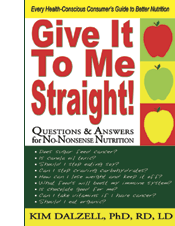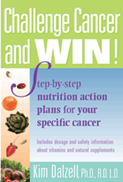|
|
 |

|
|
|
|
"Give It To Me Straight! Questions & Answers for No-Nonsense Nutrition" |
|
 With the generous support of Dr Kim Dalzell, an oncology nutritionist living in the United States, CancerStory.com received
two complimentary copies of her new book, "Give It To Me Straight! Questions &
Answers for No-Nonsense Nutrition" on 1 June 2004.
With the generous support of Dr Kim Dalzell, an oncology nutritionist living in the United States, CancerStory.com received
two complimentary copies of her new book, "Give It To Me Straight! Questions &
Answers for No-Nonsense Nutrition" on 1 June 2004.
"Give It To Me Straight! Questions & Answers for No-Nonsense Nutrition" compiles the most frequently asked questions that
Dr Dazell received over the past several years and provides answers that she feels could help people make better nutritional
choices for themselves and for the people they care about.
I had read her book and finds it extremely
useful for local cancer patients who are concerned with their
nutritional needs. I had received Dr Dalzell's consent to share the following two questions and answers that are of great
interest to many local cancer patients.
Question 1 : Is it safe to take dietary supplements if I have cancer?
Question 2 : I've just finished chemotherapy; should I go through some sort of
detoxification?
CancerStory.com had donated some copies of the above book to the National Library Board so that cancer patients and their caregivers can borrow it from their nearby library branches.
If you wish to own a copy of this book, you can order it online from
www.challengecancer.com in the United States.
|
|
"Challenge Cancer and Win!" |
|
 Yes! Nutrition affects cancer. Research studies have revealed that certain foods help or hinder your body's ability to destroy cancer cells. Clinical evidence shows how various nutrients can slow down and reverse tumor growth, jump start your immune system and protect you against the toxic side effects of chemotherapy and radiation. A guided nutritional program can also decrease your risk of malnutrition (the cause of death for 40% of cancer patients!) and promote normal cell growth and healing.
Yes! Nutrition affects cancer. Research studies have revealed that certain foods help or hinder your body's ability to destroy cancer cells. Clinical evidence shows how various nutrients can slow down and reverse tumor growth, jump start your immune system and protect you against the toxic side effects of chemotherapy and radiation. A guided nutritional program can also decrease your risk of malnutrition (the cause of death for 40% of cancer patients!) and promote normal cell growth and healing.
Upon the closure of CancerStory.com's resource centre, Humanity & Golden
Kids on 30 November 2003, I donated ten copies of "Challenge
Cancer and Win!" to the National Library Board so that cancer patients and
their caregivers can continue to borrow it from their nearby library
branches.
If you wish to buy a copy of this book, please write to Amelia at ame.de.lumiere76@gmail.com
|
|
Is it safe to take dietary supplements if I have cancer?
|
|
Answer :
Most conventional cancer doctors insist that patients avoid taking dietary supplements, especially antioxidants, until
chemotherapy and radiation treatments have been completed. More than likely they've come to this decision because of a
handful of studies have suggested that taking antioxidants might decrease the effectiveness of the treatment. For example,
studies have shown that N-acetyl cysteine or high doses of vitamin B6 may interfere with cisplatin or other
platinum-containing chemotherapies. Additionally, genistein (a soy isoflavone) has been found to compete for estrogen
receptors, potentially decreasing the effectiveness of Tamoxifen. However, we have evidence from a large number of research
studies to show that dietary supplementation during treatment may offer a variety of benefits, including immune stimulation,
cell protection, and detoxification assistance.
Numerous studies suggest that dietary supplements used during cancer treatment can support the whole body during the cancer
destruction process and prevent adverse side effects of treatment. For example, a study of breast cancer patients taking
CoQ10 during Adriamycin treatment had 20% less heart damage than individuals taking Adriamycin alone. Further supporting the
use of dietary supplements during treatment, test tube and animal findings suggest that it isn't counterproductive to take
antioxidants - in fact, they may actually enhance treatment outcome. For example, irradiated animals receiving vitamin E
before, during and after treatment exhibited lower cancer cell division than did controls, and their normal cells were also
protected from damage.
Whether or not you choose to take antioxidants during treatment, as a cancer patient you should remember that you have
unique nutritional needs, and that your chances of eating right every day to meet those needs are poor, especially if you
are undergoing treatment. If you are a cancer patient, your nutritional and detoxification requirements may also be much
higher than a so-called healthy individual's. A cancer patient's rapid cellular turnover rate and greater exposure to
damage from chemicals and free radicals point to special nutritional needs. These needs are further supported by evidence
that up to 80% of cancer patients develop some degree of malnutrition. If you don't obtain enough nutrients to sustain your
body's ever-changing state, it may be difficult to successfully recover your health. A large study in Finland drives home
this important point. Cancer patients who had lower levels of selenium and vitamin E had an eleven-fold greater death rate
compared to cancer patients who had adequate levels of these nutrients.
I urge you to seek the advice of an oncology nutritionist who can assess your diet to determine if you would benefit from
any nutritional supplementation. As always, it is important that you discuss the potential benefits and drawbacks of dietary
supplementation with your health care provider.
|
|
I've just finished chemotherapy; should I go through some sort of detoxification?
|
Answer :
Because of the potential toxic buildup of medications, exposure to food additives, preservatives, and environmental
pollutants, you may benefit from some kind of detoxification in an effort to rid the body of harmful substances. But what
kind of detoxification therapy should you do? Our bodies naturally self-cleanse through exhalation, perspiration,
urination, and bowel elimination - so if you change your diet, exercise regularly, and reduce the chemicals you put into
your body, you should be able to help that detoxification process. Beyond basic diet and lifestyle changes, there are
several detoxification therapies that are more advanced but less natural.
Fasting, one of the more uncomplicated therapies, is usually done for a specific number of days in an effort to reduce the
amounts of toxins coming in so that the body can concentrate on getting accumulated toxins out. Water is always permitted
so that dehydration is prevented. People who have problems regulating their blood sugar levels or who are in a weakened
state may have difficulty fasting for the required amount of time.
Cleansing of the large intestine with herbal, coffee, or other flushes is called colon therapy. Trained professionals use a
tube and nozzle to insert a cleansing solution into the rectum to remove toxic stool buildup. Sometimes an enema is used to
clean out the rectum so that colon therapy can be performed more efficiently, Bowel perforation, bacterial infections, and
electrolyte imbalances can occur if the procedure is not performed properly.
Chelation therapy has been used to treat heavy metal poisoning (such as mercury or lead) and hardening of the arteries.
Patients are infused with a chemical called EDTA, which binds to heavy metals in the blood. The toxic metals are then
flushed out naturally through the kidneys. Benefits of chelation therapy might be short-lived if you return to a high fat,
chemically laden diet. One of the potential drawbacks of chelation therapy is that excessive chelation treatment can also
remove from your body beneficial minerals (such as copper, zinc, manganese, magnesium, and calcium) required for normal
metabolic activity.
Before you embark on any of these detoxification therapies, I suggest you seek professional advice and monitoring. I haven't
found much data to support the theory that detoxification therapies work, but I've had patients report lowered blood
pressure, reduced blood fat levels, enhanced mental clarity, and better digestion after completing a detoxification program.
Detox naturally!
- Drink at least eight, 8-12 ounce glasses of fluid each day
- Eat lots of fruits and vegetables
- Bulk up your diet with fiber-rich whole grains and legumes
- Consider adding digestive enzymes to your supplement regimen
- Exercise regularly
- Take a steam bath or sauna
- Get a massage
- Try milk thistle, yellow dock and dandelion supplements
|
|
Healthy Eating for Life: Food Choices for Cancer Prevention and Survival |
|
Physicians Committee for Responsible Medicine (PCRM), an organisation which encourages vegetarianism, is offering a free download of its 16-page book entitled Healthy Eating for Life: Food Choices for Cancer Prevention and Survival. The URL is: http://www.cancerproject.org/resources/hefl/hefl_handbook.php
Updated on 5 Jan 2008
|
|
|
|
|



